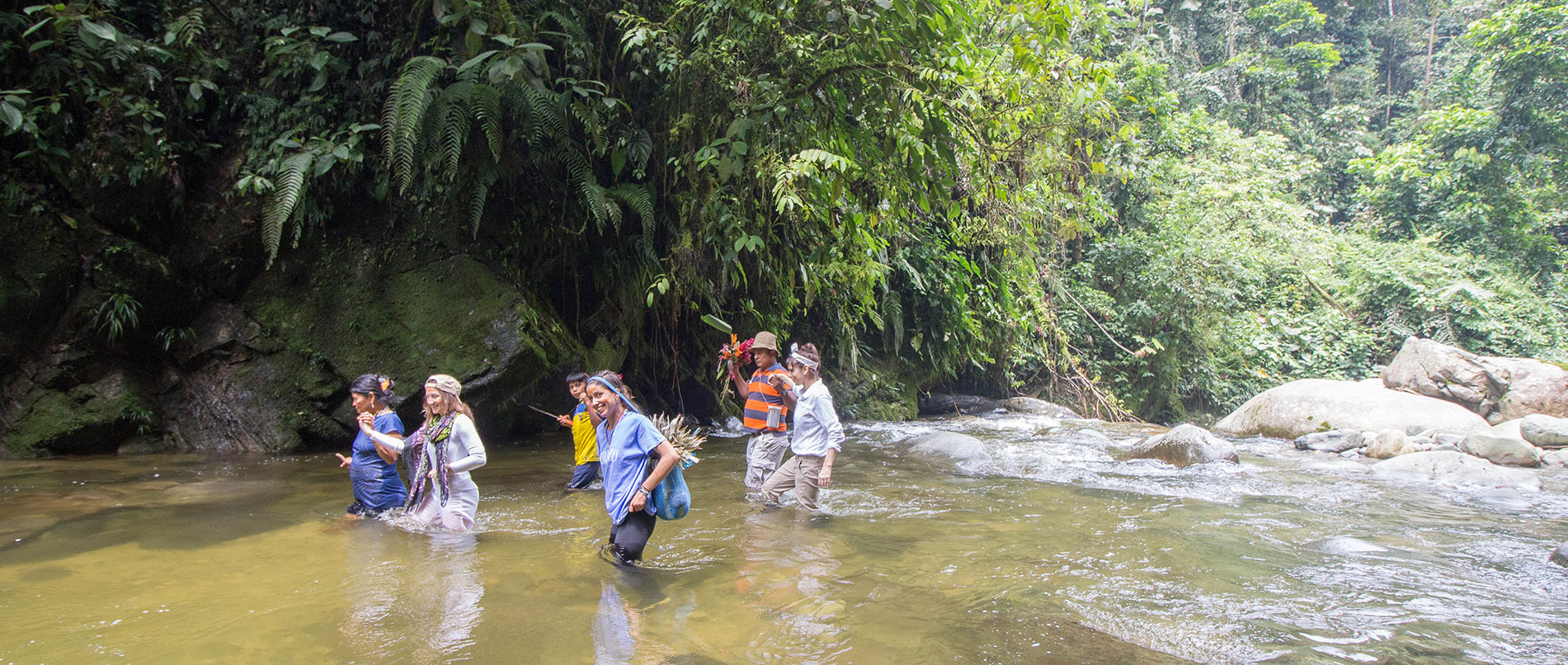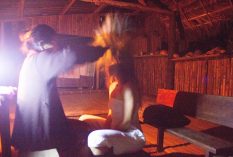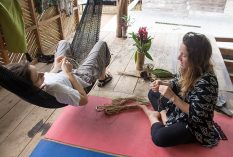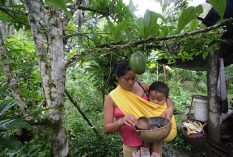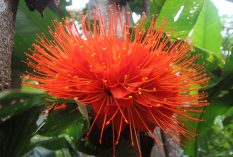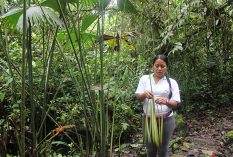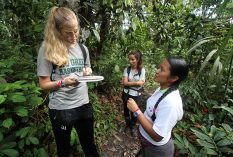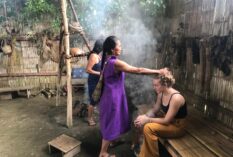Description
Location: Tena, Ecuador
Duration: Minimum 4 weeks (flexible for min. 2 weeks depending on intern’s qualifications), Maximum 12 weeks
Start Dates: Project is ongoing, and you can join throughout the year, depending upon availability
Cost: $550 for the 1st week + $400 for each additional week (2 month minimum is recommended) – see ‘Costs’ tab for further details
Benefits:
- Live with a host family that uses plant medicine and traditional healing practices
- Learn about Amazonian herbalism, traditional medicine practices, and traditional farming practices
- Learn from and collaborate with local healers
- Depending on the placement, opportunity to make salves, tinctures, balms, and more; observe and/or participate in traditional cleansings; plant medicinal plants in agroforestry farms
- Collaborate on projects that disseminate knowledge of indigenous, traditional medicine
- Opportunity to collaborate part-time in a health clinic, hospital, or governmental health organization, depending on interest
- Research & dissertation support available with partner organizations and universities, if requested
- Keywords: traditional medicine internship, herbalism, ethnobotany, clinic, midwifery, hospital placement, flexible serious internship, public health, medicine, emergency medicine, traditional healing, indigenous rights, agroforestry, biodiversity, sustainable development, research, community development, economic development, climate change, women’s empowerment.
Introduction
The Amazon rainforest is one of the most biodiverse ecosystems in the world, with over 40,000 plant species and 2.5 million insect species! Also, many species of Amazonian flora and fauna have medicinal properties, and about 25 percent of pharmaceutical drugs are derived from the rainforest. The main indigenous group in the region, the Kichwa nation, is known for using natural healing and plant medicine to treat everything from colds to chronic illnesses and wounds. Despite the existence of both traditional and Western medicine in the region, this province has a disproportionate lack of access to healthcare and a lack of educational resources for disease prevention.
Interns work in the Napo province, centered around the main city of Tena. This province is home to many natural healers, herbalists, and medicine men and women that are working hard to preserve their traditions.
Daily Life
Internships begin with an orientation in the city of Tena. After, interns spend the first few weeks getting to know their host family and internship placements. Depending on the needs of the placement, potential internship activities include:
- Identify medicinal plants and understand their importance in traditional medicine
- Establish relationships with alternative healthcare providers and specialists
- Shadow healers and medicine men to learn about local medicine traditions
- Collaborate on projects to assist healers and medicine men in disseminating information about traditional medicine and support their goal of preserving their culture
- Contribute to work in the chakra (traditionally-planted agroforestry farm) by planting, weeding, and harvesting
- Create and/or clear trails in medicinal plant gardens or chakras with locals
- Support eco-toursim projects and guide visitors as they learn about medicinal plants and traditional medicine practices
- Research local medicinal plants and national and international markets where they can be sold
Interns live with host families, allowing them to forge meaningful connections with locals during their time in the Amazon. Most host families live in rural communities close to the forest, and many have their own agroforestry farms and invite interns to join them when they plant, weed, and harvest.
An average day for a traditional medicine and ethnobotany intern looks like:
***NOTE: Schedules can differ based on the intern’s placement and projects interns collaborate on. The following sample schedule is based off of past interns’ experiences.***
- Wake up and have breakfast with host family (***If you are with a very traditional indigenous family, you can wake up with them at 4 or 5am and share in the ritual of drinking guayusa tea as a family***)
- Head to the chakra (agroforestry farm) around 7:30/8am
- Return home around 10/11am
- Free time for independent research or activities with healers or medicine men
- Lunch with host family (***OR: When interns are in the field they can buy lunch or bring a packed lunch***)
- Continue research or get involved with medicine/agroforestry activity [e.g. making salves/tinctures, go back to the chakra, help with plant inventories, learn about cleansings, shadow a healer or medicine man]
- Return home around 5/6 pm for dinner with the family (***We encourage interns to spend as many evenings and weekends as possible with their host families to make the most of their immersions, learn about the culture, and practice their Spanish***)
- Other activities to get involved in after work and on the weekends: sports, clubs, teaching English, meeting up with other interns, going on weekend trips to nearby tourist destinations, swimming in rivers, rafting, hikes to waterfalls and swimming holes, chocolate-making
Interns need to bring extra spending money for their transportation, meals not eaten with the family, and activities and travel outside of the program. The cost of living and transportation costs are explained in more detail in the intern manual provided to incoming participants to help them calculate how much extra money they should bring.
***NOTE: Specific projects change throughout the year depending on the needs of our partner organizations. The projects interns work on during their internships are based on the organization’s’ immediate needs and workflow.***
Travel & Accom.
The best airport to fly into is Mariscal Sucre International Airport (UIO) in Quito, Ecuador’s capital. Interns need to arrive to Quito no later than the night before their orientation begins. Quito is only 4 hours from Tena, the main city in the Napo Province. On the morning of orientation, a staff member schedules a taxi to pick interns up and bring them to Tena for training; they just have to pay the driver upon arrival.
Interns stay in Tena during orientation, and the cost of the accommodation is provided. The rest of the program is spent living with a local host family. This is an amazing opportunity to immerse in the local community, learn about the culture, and practice Spanish. Host families provide 3 meals per day, bedding, and a place to do laundry.
Requirements
Interns are expected to finance their own travel costs (international and while in Ecuador).
Other requirements include:
- Minimum 4 weeks commitment, recommended 8-12 weeks (flexible for a minimum of 2 weeks, however this could affect the price).
- Academic and/or professional experience in the fields of plant medicine, herbalism, global health, public health, ethnobotany, sociology, anthropology, or a related field
- Full travel & medical insurance
- Necessary vaccinations
- Necessary visa costs
Costs
$550 USD for the 1st week, $400 USD* for each week thereafter.
* Currency conversions are approximate. Use xe.com for up to date currency conversion rates
** All payments incur a 5% bank transfer fee
*** Places are confirmed with a 1 week deposit.
What’s Included:
- Accommodation during orientation
- Accommodation and 3 meals a day with a host family. Includes a private room, bathroom, all bedding, and place to do laundry
- Guided pre-departure preparation
- In-country orientation that addresses risk management, culture shock, cross-cultural adaptation skills, history/culture/politics of Ecuador and the Amazon, team-building, goal-setting, and more
- 1:1 check-ins every week
- 24/7 emergency support
- Network of doctors, therapists, and Spanish tutors in-country
- Access to network of experts and information databases for research support
- Exit interview and end-of-program reflection
- Alumni group and future references
Additionally you will need about $15/day for food for the first three days of training. You will also need to pay for your own transportations and any other activities you want to do.
What’s not included:
- Costs of flights and visa
- Costs of vaccinations
- $15 per day for food during orientation training
- Personal transportation
- Any other activities outside of scheduled program activities (white water rafting, yoga, workshops, guided jungle hikes, etc.)
Full assistance will be provided in getting all these arranged if you choose our Premium Support.
Premium Support Upgrade
We understand there’s a great deal to plan and organise for your trip. When booking a Placement, many of our participants choose to purchase our Premium Support Upgrade to benefit from the expertise, knowledge and experience of our Project Coordinators. We can provide the personal advice you need to ensure your trip is organised with excellence and planned with efficiency; ensuring the very best experience possible. Read more about how we can help you.
Tena, Napo, Ecuador
Note: Map coordinates are approximate

